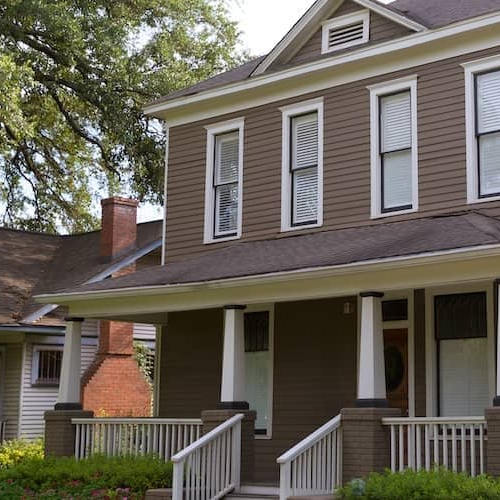Selling a house after a year: How soon can I sell?
Jun 30, 2025
•7-minute read

When you buy a home, you may plan on owning it only for a short while. Perhaps you expect you’ll start a family in a few years and need a larger home, or you expect to work your way up to a job in another town or state. Looking at it from a financial perspective, the question becomes how long should I own a home to make sure it’s worth buying in the first place? Like many financial decisions, the right one depends on your situation and your goals.
How soon can you sell a house after buying it?
According to 2024 data from Consumer Affairs, the average American owned their home about 12 years, but you can break even much sooner than that.
Nothing prevents you from selling a house immediately after buying it except that you’ll likely lose money. Most of the time, you can sell it whenever you need to, though in most cases you’ll lose money if you don’t own a home long enough to break even on the sale.
When you buy a home, you pay 3% – 6% of the sales price in closing costs. This is the money you’ll probably want to recoup before selling it.
As you pay back your mortgage, you build equity in your home. This is how much of your home that you fully own. If your house increases in value, then you end up gaining a profit on that equity. You can get a property report which will give you an estimate of what your home is currently worth. Keep in mind that this is an estimate, and you might get a different number when you get an appraisal.
Selling your house after 1 year or less
It’s difficult to build much equity or recover those up-front costs in a year or less. You also might face penalties from the loan company if they have occupancy requirements or a prepayment penalty.
There will be tax implications as well. If you live in a home for less than a year, you’ll have to pay short-term capital gains tax, which is usually heftier than the long-term version.
You should also consider the stress of buying and selling within a single year, as this will require finding a new home twice, moving twice, and filling out a significant amount of paperwork. Unless a significant life change requires you to sell your home so soon, it’s best to avoid this.
Selling your house after 2 years
Selling a house after 2 years can help you avoid some of the pitfalls you’d face when selling in under a year. For instance, your capital gains tax will no longer be considered short-term. You also might have recouped your initial losses and gained a bit of a profit. And of course, you might be in the clear when it comes to occupancy requirements for government loans.
However, it’s unlikely that you’ll have any significant gains, so it’s important to consider the hassle of moving again so soon.
What to consider before selling your house
Selling a home costs money. If you sell your house too soon, you might end up paying more than you earn from the sale. Here are some typical expenses associated when selling a home:
Capital gains tax
Capital gains tax applies to any profit you make when selling an asset. It applies to property, so if you sell a house for more than you paid for it, you’ll have to pay taxes on the profit you made on the sale. What percentage you pay will depend on your income bracket and filing status, though it will be between 0% and 20%.
If you live in a house for a very short time, say 8 months, you’ll have to pay short-term capital gains tax, which is a higher percentage than you’d face if you stayed in it for a few years.
To get a break on capital gains taxes, you must use the house as your primary residence for at least 2 of the first 5 years you own it. If you do this, you can avoid paying capital gains tax on up to $250,000 of profit – $500,000 for married couples filing jointly – when you sell your house. This means there is a very good chance you won’t have to pay capital gains tax at all.
Closing costs
Closing costs are usually 3% – 6% of the home’s purchase price.
Home values increase by more than 5% on average every year, but this is on the total price not your equity. If a prospective seller’s home falls within this average or above and they are consistent with their mortgage payments, the appreciation on the equity they build might be able to recoup closing costs within 5 years.
If your primary goal when selling the home is to turn a profit, be sure that these closing costs will be recovered by your home’s appreciation.
Local market conditions
The real estate market is ever-changing. If you’re selling a home, you want it to be a seller’s market instead of a buyer’s market. This means a low housing inventory when there’s high demand, so there’s more competition for homes.
Local housing markets can change in a heartbeat. We have a handy guide to give you an idea of what indicators to look for in the market so you know when it’s the best time to sell.
Occupancy requirements
If you received a government loan for your home, you might have occupancy requirements. Most lenders offering Federal Housing Administration and Veterans Affairs loans require that you use the home as your primary residence for at least a year.
There are exceptions to this, such as if you’re active-duty military and have to suddenly move again, but for the most part, you have to stay there a year to avoid penalties. You might have difficulty getting the same kind of loan or working with that lender in the future. Read your loan agreement carefully to understand what those might be.
Prepayment penalty
You might think you can buy a home, pay off your full mortgage early, and move out quickly. This isn’t so easy though. Not only will you have to have a lot of money on hand, especially if you want to pay it off in less than 10 years, but you might face penalties.
When you pay off a mortgage early, your lender is going to lose money they expected to gain in accrued interest. Your loan agreement will outline any potential prepayment penalties. These aren’t guaranteed though. Check your mortgage documents.
Can you avoid penalties if you sell your house early?
Whether you can avoid penalties depends on what kind of penalties you might be facing.
As we discussed, living in your home for 2 out of the past 5 years will reduce your capital gains tax burden. If you do live in that home for the right amount of time, and you buy another home immediately upon selling it, you might be able to entirely get out of the capital gains tax. But if you sell your home within a year, you’re out of luck. You can’t do much to avoid tax penalties.
If it’s penalties from your mortgage lender you’re worried about, this will depend on the lender and your circumstances. Maybe you’re selling your house within a year because of some extreme unexpected hardship. Speak with your lender and see what your options are.
Understanding equity and how long to stay before selling
Real estate is a long-term investment, with property usually going up in value over time. The more of your mortgage you pay off, the more equity you gain in the home.
Let’s say that you purchase a home for $400,000. In 5 years, the home has grown in value to $480,000 due to various factors. If you still have $320,000 of your mortgage principal to pay off, you now own $160,000 in house instead of just the $80,000 you paid. This is a hefty profit in a short amount of time.
On the other hand, maybe the house goes up to $406,000 in value in a year. Let’s say you have a mortgage balance of $385,000. You have $21,000 worth of house instead of the $15,000 you paid. However, keep in mind that you probably paid a few thousand dollars in closing costs, and now you’re facing a short-term capital gains tax and possible penalties from your mortgage lender.
FAQ
Do you still have questions? Here are a few frequently asked questions about how long to live in a house before selling it.
Can you sell a house you just bought and still profit?
Though it’s hard to put a timeline on “just bought,” you’re unlikely to make much, if any, profit by selling a house within a very short (let’s say under a year) time frame. It’s possible if there is significant market appreciation in a short time. It’s also possible if you are house flipping, and you spend the year dramatically improving the home to drive up the value.
What are the best months to sell a house?
There are certain times of the year when it’s best to sell a home. Research suggests that homes sold between March and July are generally the most expensive. This might be because spring and summer are the most common times for Americans to move. With more people moving, there’s more competition in the housing market, which is usually good for sellers.
The bottom line: It’s best to wait before selling
It is possible to sell a house right after buying it, but if you want to turn a profit, you should probably wait a few years or more. This will allow you to recoup the initial closing costs you lost as well as let your house appreciate while you build equity. There are many factors to consider, such as the local housing market and occupancy requirements. And don’t forget the emotion and effort put into buying and selling homes, either.
If you think you might need to sell a home soon after moving in, you should weigh your options of renting versus buying. On the other hand, if you think you’re ready to look for a new home, get started with our online application today.

Kate Friedman
Kate is a contributing writer and publisher who has worked with Rocket since 2022. She also works as a middle-school interventionist and has taught personal finance and life skills to high-schoolers.
Related resources
9-minute read
Starter home or forever home: Which is right for you?
A starter home is a small, affordable home for first-time buyers. Find out if it makes sense to buy a starter home or if a forever home is right for you.
Read more
12-minute read
Buying and selling a home at the same time: A complete guide
Buying and selling a home at the same time can be tricky, but it’s doable. Learn how to navigate the process smoothly with expert tips and financing strat...
Read more
9-minute read
How long does it take to sell a house?
How long it takes to sell a house varies depending on market conditions, your asking price, how long your home’s been on the market, and its overall condi...
Read more